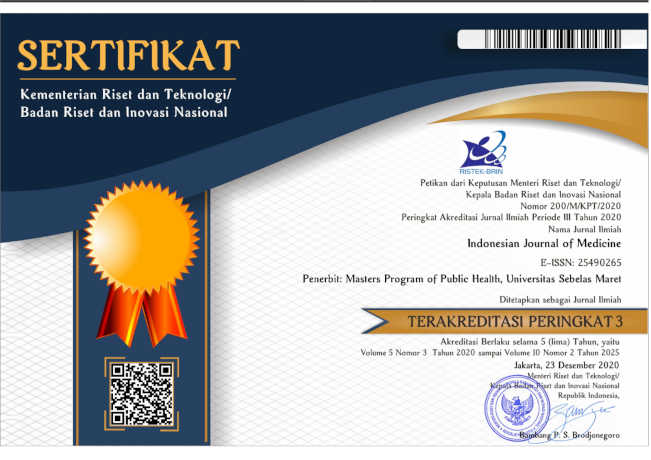The Effectiveness of Acupuncture in Insomnia Patients: Meta Analysis
DOI:
https://doi.org/10.26911/theijmed.2021.6.1.362Abstract
Background: Insomnia is a disease that has a negative impact on the health and well-being of the sufferer. Insomnia can occur in anyone, both men and women with various ages of vulnerability and in individuals with various socioeconomic backgrounds. This study aims to examine the effectiveness of acupuncture in insomnia patients.
Subjects and Method: Meta-analysis was performed with PICO which is presented as follows: the population in this study was insomnia patients aged 16-85. The intervention is in the form of acupuncture therapy. The comparison used was a sham/ placebo acupuncture. The outcome was insomnia. The meta-analysis study was applied to this study with electronic data sources: Clinical Key, Google Scholar, MEDLINE/ PubMed, Science Direct, Scopus. The article used is a full-text article with a randomized control trial (RCT) study design. There were 9 articles used in this study with a sample size of 649 people who were divided into two groups (372 people in the acupuncture group and 277 people in the sham / placebo acupuncture group). Articles were analyzed using the Review Manager 5.4 application. The results of this study aim to determine the Standardized Mean difference (SMD) and heterogeneity of the study sample.
Results: There is high heterogeneity between one experiment and another (I2= 94%; p <0.001) so that what is used is the Random Effect Model (REM). The provision of acupuncture therapy was able to reduce the degree of insomnia with the Standardized Mean Different (SMD) of 0.98 compared to sham acupuncture (SMD= -0.98; 95% CI= -1.71 to -0.25; p = 0.008).
Conclusion: The provision of acupuncture therapy was able to reduce the degree of insomnia with the Standardized Mean Different (SMD) of 0.98 compared to sham acupuncture.
Keywords: Acupuncture, Insomnia
Correspondence: Kurnia Eka Putri. Masters Program in Public Health, Universitas Sebelas Maret, Jl. Ir. Sutami 36A, Surakarta 57126, Indonesia. Email: anggipag@gmail.com.Mobile: +628995212646.
Indonesian Journal of Medicine (2021), 06(01): 42-51
https://doi.org/10.26911/theijmed.2021.06.01.05.
References
Bragg SS, Benich JJ, Christian N, Visser-man J, Freedy J (2019). Updates in insomnia diagnosis and treatment. Int J Psychiatry Med. 54(4–5): 275–289. https://doi.org/10.1177/0091217419860716.
Chung KF, Yeung WF, Leung FCY, Zhang SP (2016). Traditional Chinese medi-cine diagnosis and response to acu-puncture for insomnia: An analysis of two randomized placebo-controlled trials. Eur J Integr Med. 8(5): 797–801. https://doi.org/10.1016/j.eujim.-2016.06.021.
Dong B, Chen Z, Yin X, Li D, Ma J, Yin P, Cao Y, Lao L, Xu S (2017). The effi-cacy of acupuncture for treating depression-related insomnia com-pared with a control group: A syste-matic review and meta-analysis. Biomed Res Int. 2017: 9614810. doi: 10.1155/2017/9614810.
Februanti S, Hartono D, Cahyati A (2019). Penyakit fisik dan lingkungan ter-hadap insomnia bagi lanjut usia. Quality. Jurnal Kesehatan, 13(1): 1–4. doi: 10.36082/qjk.v13i1.51.
Godson DR, Wardle JL (2019). Accuracy and precision in acupuncture point location: A critical systematic review. J Acupunct Meridian Stud. 12(2): 52–66. doi: 10.1016/j.jams.2018.10.009.
Grima NA, Bei B, Mansfield D (2019). Insomnia theory and assessment. Aust J Gen Pract. 48(4): 193–197. doi: 10.31128/AJGP-12-18-4780.
Lin YF, Liu ZD, Ma W, Shen WD (2016). Hazards of insomnia and the effects of acupuncture treatment on insomnia. J Integr Med. 14(3): 174–186. doi: 10.1016/S2095-4964(16)60248-0.
Mandıroğlu S, Ozdilekcan C (2017). Impact of acupuncture on chronic insomnia: A report of two cases with polysomnographic evaluation. J Acupunct Meridian Stud. 10(2): 135–138. doi: 10.1016/j.jams.2016.09.018.
Murti B (2018). Prinsip dan Metode Riset Epidemiologi (Edisi V). Surakarta: Bintang Fajar Offset
Pan Y, Luo J, Zhang H (2017). Study on the effect of acupuncture at Sìshéncōng (四神聪 EX-HN 1) and Băihuì (百会 GV 20) on the serum amino acids neurotransmitters of insomnia pati-ents. World J Tradit Chin Med 27(1): 23–27. doi: 10.1016/s1003-5257(17)-30095-8.
Pei, Peng R, Gu Y, Zhou X, Ruan J (2019). Research trends of acupuncture therapy on insomnia in two decades (from 1999 to 2018):a bibliometric analysis. BMC Complement Altern Med 19(1): 1–9. doi: 10.1186/s12906-019-2606-5.
Shergis JL, Ni X, Jackson ML, Zhang AL, Guo X, Li Y, Xue CC (2016). A syste-matic review of acupuncture for sleep quality in people with insomnia. Complement Ther Med 26: 11–20. doi: 10.1016/j.ctim.2016.02.007.
White A (2017) Western medical acupunc-ture: A definition. Acupuncture in Medicine 27(1): 33–35doi: 10.1136/aim.2008.000372.
Wong ML, Lau KNT, Espie CA, Luik AI, Kyle SD, Lau EYY (2017). Psychome-tric properties of the Sleep Condition Indicator and Insomnia Severity Index in the evaluation of insomnia disorder. Sleep Medicine 33: 76–81. doi: 10.1016/j.sleep.2016.05.019.
Yin X, Gou M, Xu J, Dong B, Yin P, Masquelin F, Xu S (2017). Efficacy and safety of acupuncture treatment on primary insomnia: a randomized controlled trial. Sleep Medicine. 37: 193–200. doi: 10.1016/j.sleep.2017.02.012.
Yuan QL, Wang P, Liu L, Sun F, Cai YS, Wu WT, Ye ML, Ma JT, Xu BB, Zhang YG (2016). Acupuncture for musculoske-letal pain: A meta-analysis and meta-regression of sham-controlled randomized clinical trials. Sci Rep. 6: 1–24. doi: 10.1038/srep30675.











